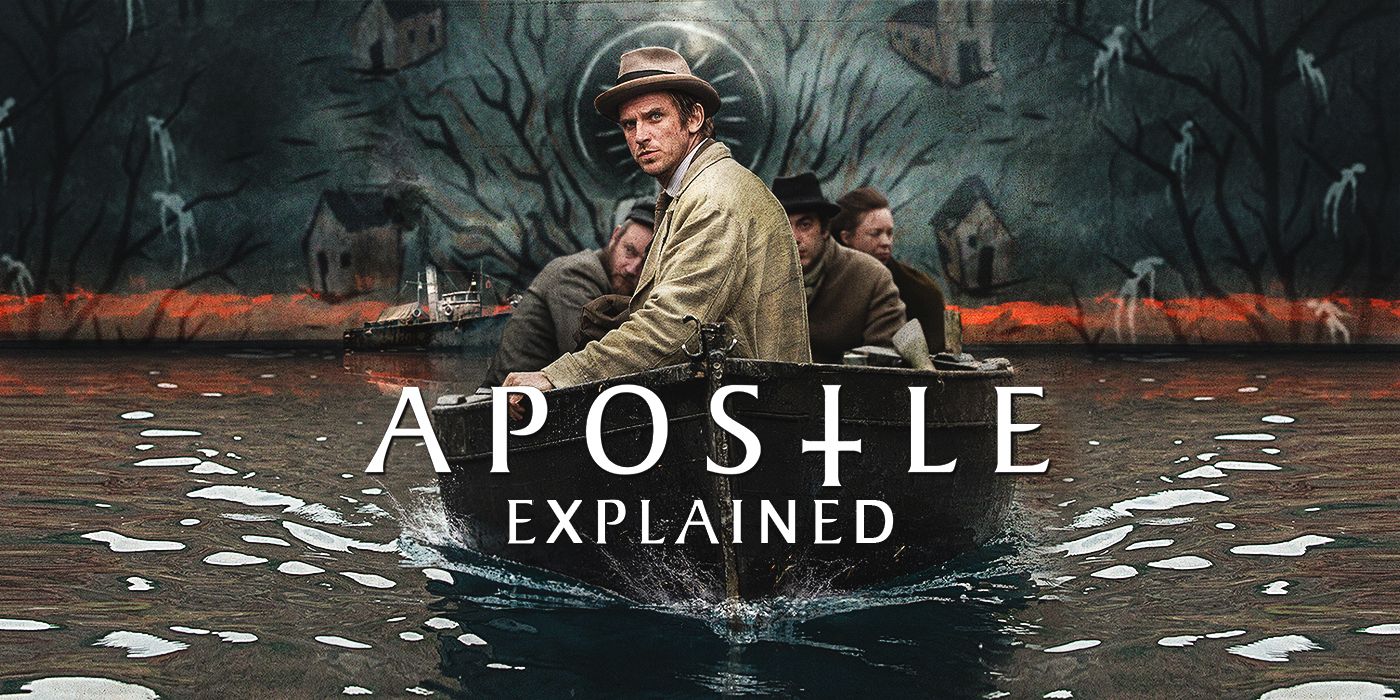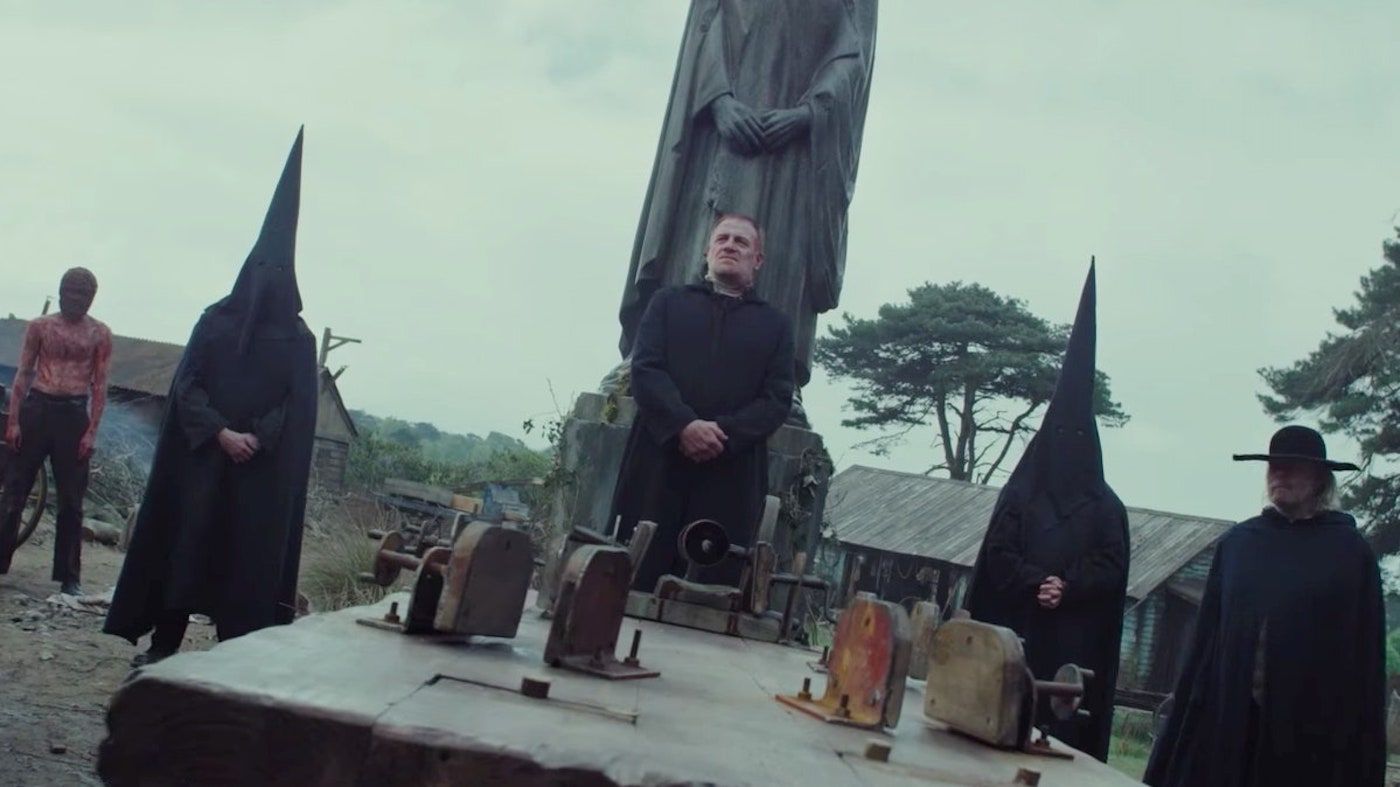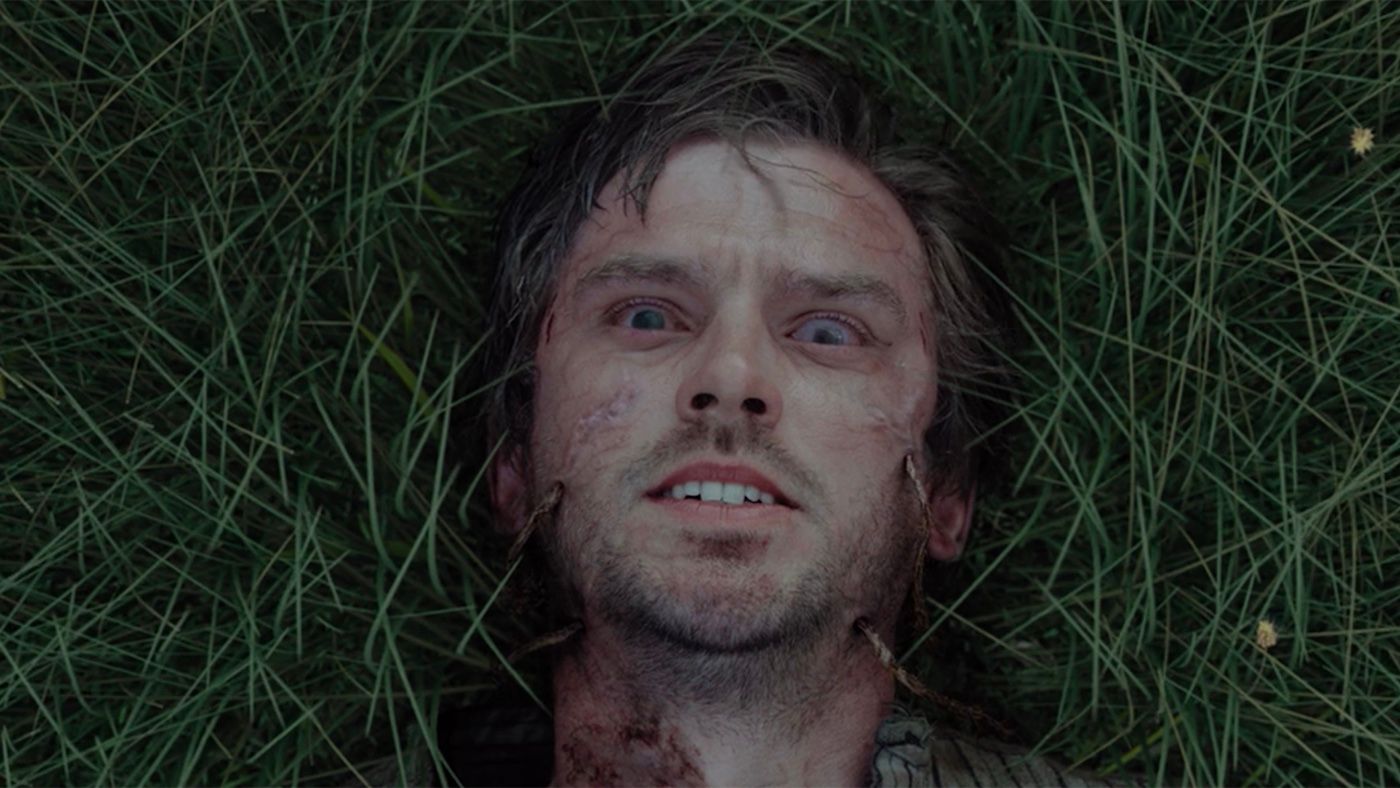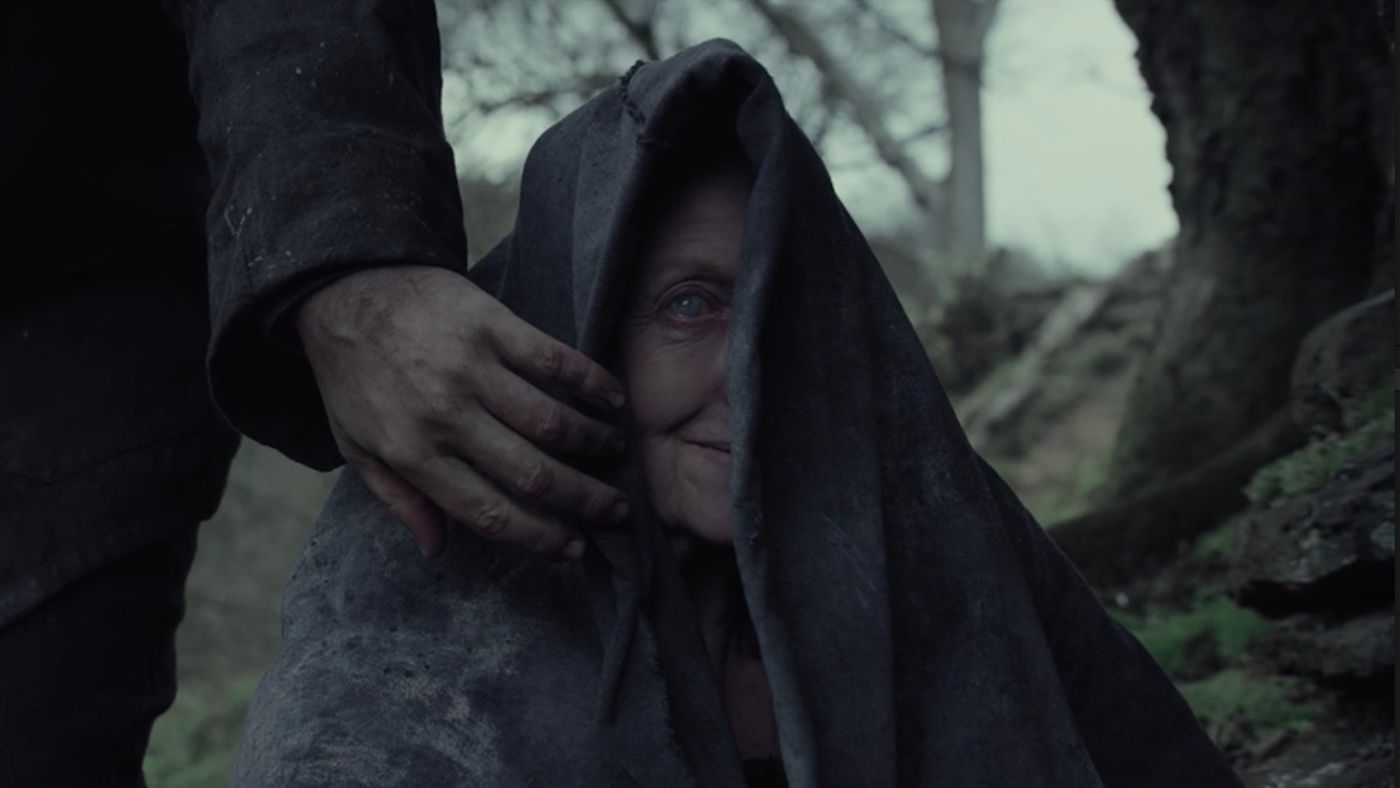Apostle is not for the faint of heart. Take your pick of suffering and gore, from power-thirsty cult leaders to a brittle wasteland withering away in isolation, a guard is known as the Butcher who has a wasp’s nest for a head- oh and the blood! So much blood. The Gangs of London creator, Gareth Evans stunned Netflix audiences with this grisly tale of birth, death, and renaissance. In 1905, we follow Thomas (Dan Stevens), an ex missionary priest who loses and completely rejects Christian faith after persecution during Boxer Rebellion era China. To add insult to injury, he returns home to the news that his sister, Jennifer (Elen Rhys) has been kidnapped for ransom by an excommunicated and obscured Welsh cult run by political convicts and the Goddess (Sharon Morgan), sometimes referred to as “Her”. From the jump, Evans offers a direct tie between humanity and the land as we learn of the failing crops, dying livestock, scarce provisions, and the ridiculous amount of ritualized bloodshed.
It’s implied that the Goddess has waited in solitude for an extended period. So when members of the cult, including leader Malcolm (Michael Sheen), discover her capabilities, her first new interactions with humanity result in her slavery. The Goddess reflects an embodiment of Mother Earth herself. And what much of humanity fails to realize is that the Earth will give what it gets. Her does exactly that. Blood works as the Goddess’ main source of nourishment hence why every community member must offer their own blood. Initially, the men give her their tainted blood as back then, their mission was to self-sustain, and reign over their own contorted paradise. Over time, the more demented the leaders became, the less She had to offer.
The moment Thomas arrives and she reveals herself to him, the Goddess wails out for freedom yearning to restore her lifeforce, the Earth. Random growths along church walls, blood that trickles down as if magnetized to the soil, no matter where it was spilled, the Goddess operates in a twisted harmony with the blood of the islanders. So why all the blood? These rituals and traditions have entrenched themselves in humanity’s occult history predating even the Greeks.
Modern paganism has revitalized a shift away from organized religion (as we know it today) to a focus on appreciation and protection of the physical Earth and its spiritual life force. Apostle’s fascinating cryptid has strong influences from the Sumerian agricultural rituals for a plentiful harvest, the latter inspired Persephone from the mysteries of the Minoan/ Mycenaean religion, and Welsh femme deity Arianrhod. These idols all have facets illustrated in the magic of the island Goddess. Here are the three supreme godheads.
Ninlil
Some Sumerian cultures like many archaic communities heavily believed in the Sun and Moon as gods/goddesses. The grain goddess Ninlil holds stark similarities to Apostle’s Goddess as seen in her initial sovereignty of the crops, her punishment of the cult in killing unborn livestock, and creating toxic grains. Ninlil was regarded as a deity to protect seasonal harvests. Her myth stems from a vicious sexual assault that resulted in her captivity in the underworld alongside her attacker and husband, Enlil. Ninlil continually assaulted, gave birth to four children who would later become gods. Her tale was recounted as a means to understanding how cyclical life can be: for humans coexisting amongst the environment and animals.
In the film, we witness her influence whenever the Goddess poisons the land and livestock. Ancient people turned to Ninlil in their desperation when crops failed just at the Apostle islanders turned to their Goddess perverting the spiritual relationship with gruesome force-feedings. And in the manner of karmic continuation, the Goddess returned the bad blood she was fed, withering the land in rejection of their distorted ‘worship’. She repeats the same lesson as seen in the death of stillborns and gutted lambs, grain stalks that sizzle and crumble to dust in one’s hand. And black dirt that absorbs the blood and still fails to quench Her’s thirst.
Persephone
Ninlil’s tale more recently has become sighted as an influence to the Eleusinian Mysteries of Persephone and her mother Demeter of the Mycenaean period. Persephone was abducted and raped by Hades, forced to spend half of her years in the Underworld. Demeter, in her distraughtness, laid waste to the Earth letting animals and plants die until her daughter was returned to her. Persephone was illustrated as a woman sprouting from the Earth surrounded by flowers and greenery. An omen of physical reincarnation. Their legacy entails the stages of loss, spiritual vision, and ascension., practices that scholars and practitioners alike still maintain.
Yet, the Goddess’ legacy presents as cave drawings soaked in sacrificial blood, chronicling her great sorcery and destiny of resurrection with no followers to adorn her. Like Persephone, the Goddess as a woman was violated by the cult leaders with her powers restricted to masculine rapacity and means of escape. In the film, she initially blesses the island in abundance, but after realizing the cult had little intention of divine connection and appreciation, the Goddess piled on the anguish with a dwindling absence of life; her personal path to restorative justice.
This imbalance sparked by selfishness, primal fear, and unforgivable depravity was only corrected when Thomas entered the land and listened to Her’s cry. As seen in the film, greenery isn’t even restored until Thomas connects with her visions, her blood, her fears. He understands her karmic intent, then burns her to fulfill her destiny: ascension.
Arianrhod
A final interpretation of Her can be found in the Welsh/Celtic deity, Arianrhod. She comes from the mythological text, the Mabinogi. Arianrhod Is described as having striking pale skin, she preferred men of the sea and was deemed a goddess of ancient virginity and captivating sexual freedom. Keeping with the themes of reincarnation, rejuvenation, and cycles, one of her nicknames included ‘Silver Wheel’, and her rituals are associated with the Moon. Throughout the film, the Goddess adheres to Arianrhod’s description almost exactly: pale skin gleaming a bleak grey, waiting by the sea with her only company being the cult leader triad.
Arianrhod takes the cake as the strongest influence for Apostle's Goddess. Her rituals included a company of female worshippers who treasured chaste virginity (independence from a man). Arianrhod sought that femme energy and that women be valued. Her throne adorned in shrubbery and dirt as she sprouts from the Earth, and women were to vibrantly sway, reciting invocations in her honor. Yet, for Her, the throne transformed from thick green vines into sickly venomous enmeshments of branches and thorns. The islander women like Malcolm’s daughter Andrea (Lucy Boynton) and Quinn’s daughter, Ffion (Kristine Frorseth), both of whom fall prey to unwavering faith and unsought chastity. Women like the captive virgin, Jennifer, were spiritually beaten into submission, forced to fall for the sins of men.
The Goddess resonated with their vulnerability, their innocence, and their wounds. And she ultimately aids their escape with full intent on revenge against her captors and their cronies. The landscape throughout the film contrasts the harsh conditions that the cult has fostered. In the land of false prophets, in a state of natural chaos, the Goddess lay immobilized, dying in the coils of soot and mixed blood. In all the time she’s had to plot, her spiritual wounds festered. And she could sense her world as a god slowly drifting away with every pound of flesh guzzled down her throat out of survival, not volition. How could one not seek retribution for these atrocities against Earth herself?
These lore and texts prove essential to determining who’s life force matters more. Does humanity, with all our consistent greed, temporary elations, and cyclical suffering triumph the magnificent and essential life force that is Mother Earth? Nature always finds a way of winning it seems. And the Goddess proves to be an entity churning the wheels of destiny just when the sun falls and the moon rises.




